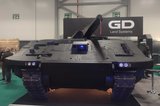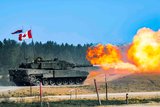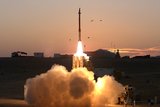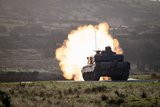SAAB receives NLAW order
Saab will deliver the Next generation Light Anti-tank Weapon (NLAW) to an unnamed customer under an order announced on 22 December.
NLAW gives an individual soldier the ability to destroy heavily protected modern main battle tanks with a single shot. Immediately upon target detection, the soldier - without having to mount the system - can load the weapon and complete a lock-on before launch, attacking the tank from above.
Deliveries will take place during 2016 and 2017.
Görgen Johansson, head of Saab business area Dynamics, said: ‘There is an increased interest and demand for lightweight anti-tank weapons on the market and this order is a strong proof of our customers' trust in the NLAW system.
‘In many countries, there has been a large focus the last decade on building up the capability to fight a war on terror, but we now see that many countries again also realise that the capability to fight a modern mechanised enemy, on an individual soldier level, is becoming more and more important. A system like NLAW provides that capability.’
Related Equipment in Defence Insight
More from Land Warfare
-
![US DoD task force’s DroneHunter acquisition lays groundwork for Replicator 2 CUAS strategy]()
US DoD task force’s DroneHunter acquisition lays groundwork for Replicator 2 CUAS strategy
As the US Department of Defense looks to counter the growing threat of uncrewed aerial systems to improve homeland security, the DroneHunter acquisition could point to future commercial innovation.
-
![Land forces review: Tanks, trucks and IFVs dominate but woes remain for Ajax]()
Land forces review: Tanks, trucks and IFVs dominate but woes remain for Ajax
This year has begun with main battle tanks taking the lead while orders for large logistics and support vehicles continued from last year. Additionally, two of the British Army’s most significant contracted vehicle programmes, Ajax reconnaissance vehicle and Challenger 3 tank, continued to make news in January.
-
![Canada looking to expedite purchase of armoured fighting vehicle and a new tank]()
Canada looking to expedite purchase of armoured fighting vehicle and a new tank
Canada is improving its Leopard main battle tank fleet but before this is fully completed, it is expected to begin looking for new vehicles.
-
![Layered protection: How air defence is adapting to rising drone and missile threats (podcast)]()
Layered protection: How air defence is adapting to rising drone and missile threats (podcast)
A surge in aerial threats – from advanced missiles to low-cost drones – is reshaping the way militaries approach air defence, driving demand for flexible, multi-layered solutions.
-
![UK agrees parallel development and production process for British Army Challenger 3]()
UK agrees parallel development and production process for British Army Challenger 3
In a bid to accelerate delivery of the British Army’s Challenger 3 main battle tank, which has just carried out its first crewed firings with the latest Rheinmetall 120mm L55A1 smoothbore gun, the UK has opted for an unconventional approach.






















